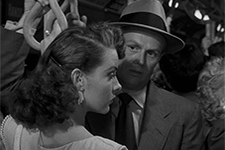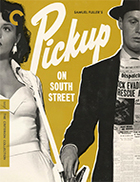Pickup on South Street
|  Samuel Fuller, a former New York crime reporter, novelist, and Word War II veteran, had been writing Hollywood screenplays to pay the bills since the mid-1930s, but when he made Pickup on South Street, he had only been directing for four years. Yet, in those four years, he had worked prodigiously, making five films—two westerns, two war movies, and a newspaper exposé—during which time he honed his visual skills and sharpened his sense of bombast to a state of near perfection. Fuller has always been regarded as a great contradiction, a quintessentially American filmmaker—tough, brash, melodramatic, blunt—who nonetheless had an artistic sensibility that made him much loved in Europe, particularly France, where he lived and worked for the last 15 years of his life. His films were rarely subtle, but they were always more intelligent than you would expect, and he remains to this day one of the most visually gifted filmmakers ever to work behind a camera. Like Alfred Hitchcock, Martin Scorsese, and Stanley Kubrick, he had an innate sense of exactly where to place a camera and just how to move it for maximum effect. Without Fuller’s artistry and commitment, Pickup on South Streetwould probably have been just another middling film noir potboiler. But, by infusing it with his obsession with the lived experiences of the lower rungs of the social ladder, Fuller turned the film into an intriguing social document as well as a thriller by centering it around a triumvirate of otherwise unsympathetic characters: a pickpocket, a prostitute, and a professional stool pigeon. Despite their antisocial behavior, exactly the kind of stuff the Production Code Administration wanted to banish or at least punish, they emerge from Fuller’s carefully structured mise-en-scéne as fully human characters who earn our sympathy and our identification. Richard Widmark, already typecast as a seedy sort, plays Skip McCoy, a professional pickpocket (know on the streets as a “cannon”) who is already a three-time loser and is thus looking at the potential of life in jail if he is busted again. That doesn’t stop him, however, from lifting a wallet from Candy (Jean Peterson), a young woman on the subway. Turns out that Skip got more than he bargained for because Candy was working as a courier for her ex-boyfriend, a sweaty hoodlum named Joey (Richard Kiley) who is selling secrets to a ring of communist spies. Candy’s wallet contains several strips of government microfilm with the formula for a secret chemical, and once Skip steals it, he is targeted by both sides of the Cold War: the FBI and the reds. The existence of the communist angle in Pickup on South Street has little to do with any uncomplicated patriotism felt by Fuller (when his pickpocket antihero barks “Don’t wave a flag at me,” you can almost hear the lines coming from Fuller’s own lips). Rather, its inclusion results mostly from the fact that it happened to be made right in the middle of a cycle of anti-communist Hollywood movies. It was hard to make a thriller at that time without including Stalinists hiding under someone’s bed. As others have pointed out, the unimportance of the communists in the film is underscored by the fact that the French were able to simply write them out by changing the subtitles to refer to drug dealers; not a single frame of the film had to be edited to elide the film’s political content. In a way, the forced inclusion of the communists as the bad guys is the film’s weakest point. Fuller is clearly more interested in the lives of his main characters than he is in red-baiting. The film’s best moments are when his central characters are at their most vulnerable because it is here that we see the humanity glimpsing out from behind their tough facades. This is never so evident as in the heartrending scene in which Moe (Thelma Ritter), a professional stool pigeon who helps the cops track down Skip but not the commies, stares down a gun and sadly tells her would-be killer to put her out of her misery. Ritter, probably best known as the wisecracking nurse in Hitchcock’s Rear Window (1954), brings great complexity to a role that could have been just another cliché. Her Moe is a woman of great intelligence and practicality; she is saving her money not for worldly goods, but for a decent burial plot so she won’t be dumped in Potter’s Field. Widmark likewise turns Skip into a compelling piece of work despite his clearly antisocial tendencies (the ramshackle fish-and-bait shack in which he resides is a perfectly realized hideout for a man who wants nothing to do with the outside world). Although a nonviolent criminal, Skip has a dark vein pulsing beneath his skin, and the scenes in which he brutalizes Candy when he thinks she isn’t playing him straight are among the toughest in the film to stomach. Jean Peterson’s Candy is easily the film’s lamest character, although it can’t all be blamed on her one-note performance. As written, her character is too weak; despite the fact that she is trying to reform herself, she seems to have no will or backbone, and she suffers constantly because of it. Still, Pickup on South Street works far better than most films of its ilk. Fuller establishes a gritty reality to what is otherwise a rather fantastical mishmash of crime melodrama and Cold War paranoia. Fuller and cinematographer Joe MacDonald, a three-time Oscar nominee, give the film the requisite film noir look of inky shadows and tons of horizontal lines, but what you remember most is the sense of visual claustrophobia that spills over into the characters’ emotional entanglements. Whether it be Fuller’s intense use of close-ups in the dramatic scenes or an anxious, knuckle-grinding moment in which a character tries to make a daring escape through a dumbwaiter, Pickup on South Street keeps the tension racheted high even as it refuses to play by simplistic genre expectations.
Copyright © 2021 James Kendrick Thoughts? E-mail James Kendrick All images copyright © The Criterion Collection | |||||||||||||||||||||||||||||
Overall Rating: 


 (3.5)
(3.5)


